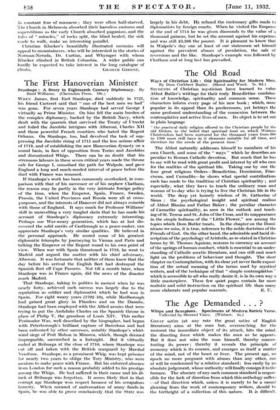The Old Road
Ways of Christian Life : Old Spirituality for Modern Men.
By Dom Cuthbert Butler. (Shoed and Ward. 7s. 6d.) STUDENTS of Christian mysticism have learned to value Abbot Butler's writings for their truly Benedictine combina- tion of knowledge, spirituality and common sense. These characters inform every page of his new book ; which, more popular in. its appeal -than its predecessors, yet betrays the same profound understanding of the connexion between the contemplative and active lives of men. Its object is to set out in plain language "the practical daily religion offered to the Christian people by the old Orders, in the belief that spiritual food on which Western Christendom had been nurtured for the thousand years from SOO to 1500 must still have in it elements suitable for all time, and therefore for the needs of the present time."
The Abbot naturally addresses himself to members of his own Church, and some of the " ways " which lie describes are peculiar to Roman Catholic devotion. But much that he has to say will be read with great profit and interest by all who care for the realities of the spiritual life. Taking one by one the four great religious Orders—Benedictine, Dominican, Fran- ciscan, and Carmelite—he shows what special contributions each has made to the tradition of Christian spirituality ; and especially, what they have to teach the ordinary man and woman of to-day who is trying to live the Christian life in the world. The deep yet homely wisdom of St. Catherine of Siena ; the psychological insight and spiritual realism of Abbot Blosius and Father Baker ; the peculiar character of Carmelite spirituality, as seen in the outlook and teach- hig of St. Teresa and St. John of the Cross, and its reappearance in the simple holiness of the "Little Flower," are among the topics which Dom Butler treats. In the chapter on the Domi- nicans we miss, it is true, reference to the noble doctrines of the Friends of God. On the other hand, the admirable and lucid de- scription of the psychology of Aristotle, as re-stated in Christian terms by St. Thomas Aquinas, restores to currency an account of the springs of human conduct, which is essential to an under- standing of Catholic ascetic literature, and can still cast much light on the problems of behaviour and thought. The short Chapter on Contemplation, with its clear yet never facile exposi- tion of the actual meaning of the terms used by mystical writers,_ and of the technique of that " simple contemplation '' which is accessible to all who really desire it, is in its own way a little masterpiece. These few quiet pages contain far more realistic and solid instruction on the spiritual life than many more elaborate and popular manuals. E. U.


































 Previous page
Previous page